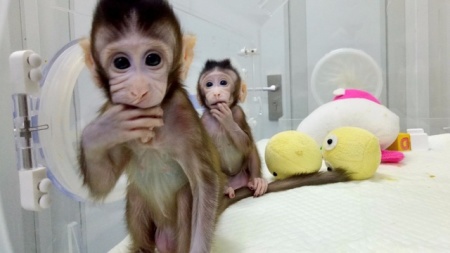Monkey Clones: Harbingers of Things to Come?

A hot new story dominates science news: the cloning of macaque monkeys. An amazing technical accomplishment, it also elicits dread. The Sun, a publication of News UK Company, labeled the cloning 'Monstrous,' saying "The cloning of Macaques Zhong Zhong and Hua Hua have prompted fears from critics the technique will be used to create humans."
And rightly so.
In the process of researching for this story I ran across this:
Oregon Dispensaries know our clones and there's a reason why..... Our #1 priority is to delivery Healthy, Established, Lush, Problem Free Clones to your facility. We know how important a healthy clone is and we will never send product out our doors without it meeting Green Monkey's strict standard.[1]
"My God!" I thought for one brief moment. Then I realized they were talking about Cannabis clones[2], but still, for that first instant I was horrified, imagining a day when such an advertisement might be written about human clones.
Images from science fiction stories filled my head. The idea of replicated humans goes back as far as 1939 (William F Temple's Four-Sided Triangle (November 1939 Amazing Stories), and remains a common theme. More recent films to use the idea include The Clone Master (1978), Superman IV: The Quest for Peace(1987), Alien Resurrection (1997), Gattaca (1997), The 6th Day (2000), Replicant (2001), and Star Wars: Episode II – Attack of the Clones (2002).
Cloning strikes at the heart of our sense of individuality, and our concern about the status of any humans that are clones. Books and movies evoke fears of clones treated as third class citizens, even being used as sources of spare body parts. Whether clones could be considered fully persons, whether they would even have souls, has been debated both in books and in the press each time a cloning advance is made.
The most horrifying aspect of cloning would be that clones might be considered utilitarian objects, for use by the "owner" as he or she wills, as a means of extending life or achieving immortality, or to replace a dead child or lover. Clones might be viewed as replaceable, easily cast away once their use is fulfilled. We as a society already struggle with utilitarianism, where some view human beings as of worth only if they are useful, functional, contributing members of society. Disabled, elderly and the very young and unborn are devalued. We already struggle with organ trafficking, and the sale of embryo parts for research. Euthanasia and abortion threaten the elderly and disabled. How could our society survive the existence of a class of humans created not out of love, or even desire, but as a means to an end?
Why do scientists pursue this in the face of such societal concerns? In all honesty, it's the thrill of being the first to do something that has never been done before, though that is not stated in the paper. It definitely wasn't easy. It took more than twenty years from the cloning of Dolly the sheep until the successful cloning of a monkey from a fibroblast cell. Counting Dolly, 23 other species have been cloned, including sheep, mouse, cattle, pig, cat, rat, and dog. Much has been learned about early mammalian development that made this possible along the way.
Here's what the authors said about the results and their motivation in their article "Cloning of Macaque Monkeys by Somatic Cell Nuclear Transfer," published in the journal Cell [ Liu et al.]
"This study demonstrated that cloning of non-human primates is feasible by SCNT [somatic cell nuclear transplant] using fetal somatic cells, which could be efficiently modified by genetic editing and screening in vitro (Gao et al., 2017, Lai et al., 2016, Rogers, 2016). Such cloning allows the production of genetically uniform monkeys as animal models for basic research in primate biology and for studying human disease mechanisms and therapeutic treatments."
In other words, having cloned organisms makes experiments easier—you can compare results between individuals that are nearly genetically identical, removing a large source of experimental error. In the process of cloning you can also modify them genetically, or screen them for defects. That was slipped in quietly, wasn't it? Very modest and pragmatic.
I have to keep reminding myself we are only talking about monkeys here, and that the researchers guarantee they have no intention of moving on to human cloning.
The paper describes how difficult the experiment was, though: many embryos died before the right techniques were found, and almost all failed to make it through gestation or birth. Out of 127 eggs injected with somatic cell nuclei, 79 were transferred into surrogate mothers. Six pregnancies resulted, giving rise to two live births. It remains to be seen how healthy these cute little monkey clones will be. Clearly this is a very low yield process, with losses all along the way. And this calculus does not include the other part of the experiment where they tried a different method, using 290 eggs, resulting in 22 pregnancies and two live births but no surviving monkeys. Now imagine this when talking about human cloning.
From all this it should be clear: while this may be a scientific breakthrough, it comes with a very high price tag, monetarily, and morally.
Let us hope, fervently and prayerfully, that the scientific and regulatory communities prohibit the next step.
References:
[1] https://greenmonkeymeds.org/cannabis-clones
[2] Oregon was the first state to legalize pot, and plants are much easier to clone than animals.




















